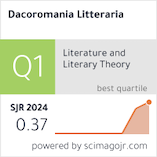REINVENTING THE ARCHIVE OF LITERARY HISTORY. THE ROLE OF BIOGRAPHICAL FICTIONS
(Abstract)
The so-called “objective” method of archival documentation and the no-less-common opposite temptation of reinventing, of fictionalising, as it were, the past are topics debated both in the sphere of literary theory and in that pertaining to the theory of the theatre or the visual arts. Theoretical disputes have brought to the fore several concepts with significant interpretative potential, which can be squared with the current research methods, or may lead to the refinement or revalorisation of the older ones: authorship (“auctoriality”), (inter)subjectivity, theatricality, imagological and identitarian clichés, comparatism, aesthetic distance and distant reading, metafiction, new historical fiction, incarnation, absorption, immersion. These are concepts whose interpretative or “interpreting” ability can always be verified, especially when they do not function independently of each other, but are complementary tools for analysis and aesthetic judgment. The study aims to reconsider the concepts above, the distinctions and complementarities between them, their validity or their entry into crisis, by resorting to the interpretation of two metafictional texts that I consider to be genuine “theoretical objects”, namely two books written by the essayist and novelist Ion Iovan: the biographical essay Mateiu Caragiale. Portretul unui dandy român [Mateiu Caragiale. The Portrait of a Romanian Dandy], 2002 and the biographical-fictional novel Ultimele însemnări ale lui Mateiu Caragiale însoţite de un inedit epistolar, precum şi indexul fiinţelor, lucrurilor şi întâmplărilor în prezentarea lui Ion Iovan [The Last Notes of Mateiu Caragiale Accompanied by an Unpublished Epistolary Novel, as Well as by an Index of Beings, Things and Events in the Presentation of Ion Iovan], 2008.
Keywords: authorship, aesthetic distance, theatricality, biographical fiction, metafiction.


